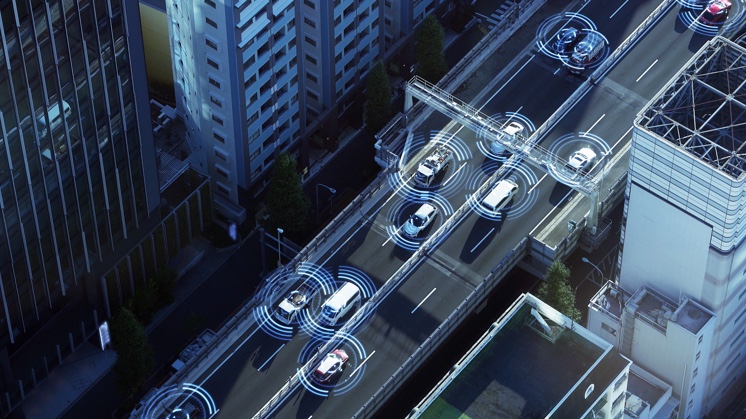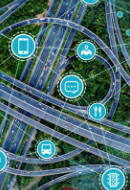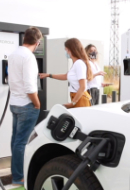MaaS (Mobility as a Service)
Mobility as a service (MaaS): a digital, efficient and sustainable form of transport
R&D Sustainable mobility Electric mobility
Mobility is changing thanks to new technologies, and part of the population is opting for pay-per-use shared vehicles, eliminating fixed maintenance costs. These services can be accessed on the internet quickly, conveniently and safely. In addition, this new trend also helps to reduce pollution and protect the environment.

Mobility in big cities has become both a personal and an environmental challenge. Stress, traffic jams, air pollution and the associated premature deaths, as well as noise pollution all call for new mobility solutions. The mobility of the future must therefore be healthier for the user and the environment, and the centralisation of services through digitalisation (Mobility as a Service - MaaS) is one way to achieve this.
What is Mobility as a Service (MaaS)
According to the MaaS Alliance, the leading international Mobility as a Service community, it is the integration of various forms of transport, public or private, into a single on-demand service. For example, if need to take the bus and then an electric scooter to get somewhere, instead of having to locate, book and pay for each mode of transport separately, the MaaS platforms make it possible to plan the journey door-to-door using a single mobile application.
The notion of a digitally connected multi-mode transport network began to be discussed with the real-time connectivity offered by smartphones. The incorporation of shared-use vehicles or rideshare, from electric cars to bicycles and scooters gave the concept a boost. Now, the application of artificial intelligence, big data and the Internet of Things to transport planning further expands the mobility options for urban users.
How does Mobility as a Service (MaaS) work?
With MaaS, urban mobility becomes as simple as planning, booking and travelling, all from a single app.
Choose your destination
Open the MaaS (Mobility as a Service) application on your mobile phone and enter the destination you want to go to.
- The app uses GPS to identify your location.
- Put in your preferences: arrival time, maximum travel time, cost or preferred mode of transport (bicycle, public transport, taxi, etc.).

Plan your trip
The application analyses the transport options available in real time and proposes several routes combining different modes of transport.
- Optimised routes are shown by time, cost and sustainability.
- The app incorporates real-time information, like delays in public transport or bike availability.

Reserve and pay
Once the route has been chosen, the user can book the services from the application itself and pay once for all the legs of the trip.
- Compatible with different payment methods: credit cards, digital wallets (like Apple Pay or Google Pay), or monthly subscriptions.
- Instant confirmation of bookings for each leg.

Make your trip
You take your trip as planned and enjoy a seamless experience thanks to the planning of the different modes of transport. During the trip, the app provides real-time updates on your progress.
- GPS-guided navigation.
- Support options in case of mishaps.

Characteristics of Mobility as a Service (MaaS)

Future of mobility
How can urban mobility adapt to today's world and helps to save the planet?

Types of electric vehicles
Complete guide to the different types of electric vehicles.

Electric car batteries
Everything you need to know about electric car batteries.

Infraestructure for electric mobility
Are our roads ready for the electric vehicle revolution?
Benefits of Mobility as a Service (MaaS)
Sustainable mobility is vital in the fight against climate change. For this and other reasons, in 2016 the United Nations adopted the New Urban Agenda, which includes the need to provide city dwellers with integrated and sustainable mobility options. But its benefits go beyond the environmental, as we can see below:
Types of Mobility as a Service (Maas)
Whilst the integrated transport systems proposed by Mobility as a Service are under development, there are different solutions for harnessing mobility resources:
- Private fleets: mainly developed by car manufacturers, such as ShareNow, previously Car2Go (Mercedes-Benz), Zity (Renault) or Free2Move (Citröen).
- Public fleets: numerous city councils already offer bicycle services for shared use, many of them electric.
- Mixed fleet: services like Uber, Lyft, Juno, Bolt or Cabify allow owners to offer their vehicles to other people (in certain countries this use is regulated under private licences).
- Private: platforms such as BlaBlaCar, Drivy or Zipcar allow private individuals to share the use of their own vehicle and the travel costs.
MaaS platforms offer added value services through their mobile apps: information on the location and availability of transport, both mobility (vehicles) and micro-mobility (bicycles and scooters), journey monitoring and traffic conditions from the beginning to the end of the trip, or data analysis and the creation of mobility patterns that can be used in the formulation of public mobility policies and infrastructures.















